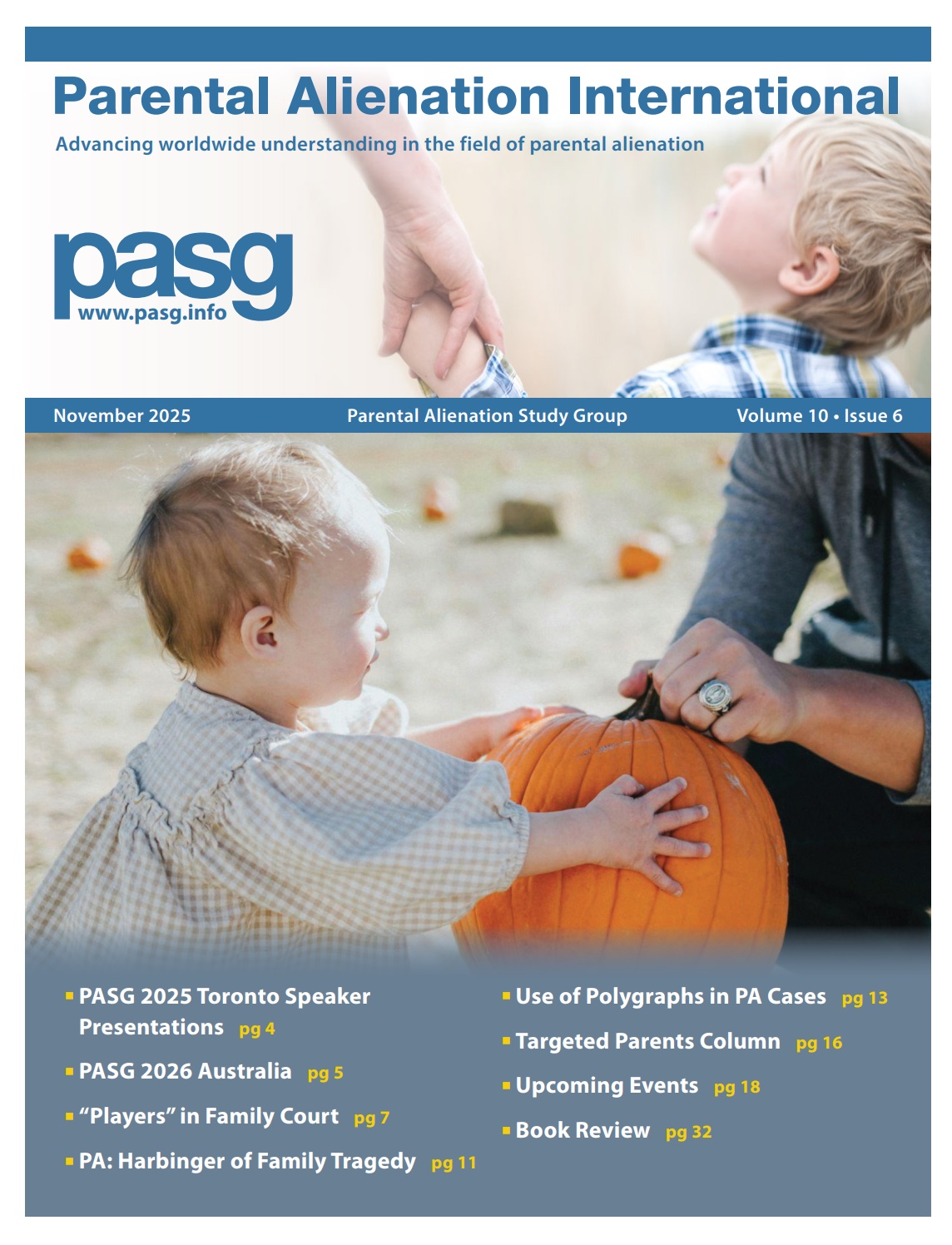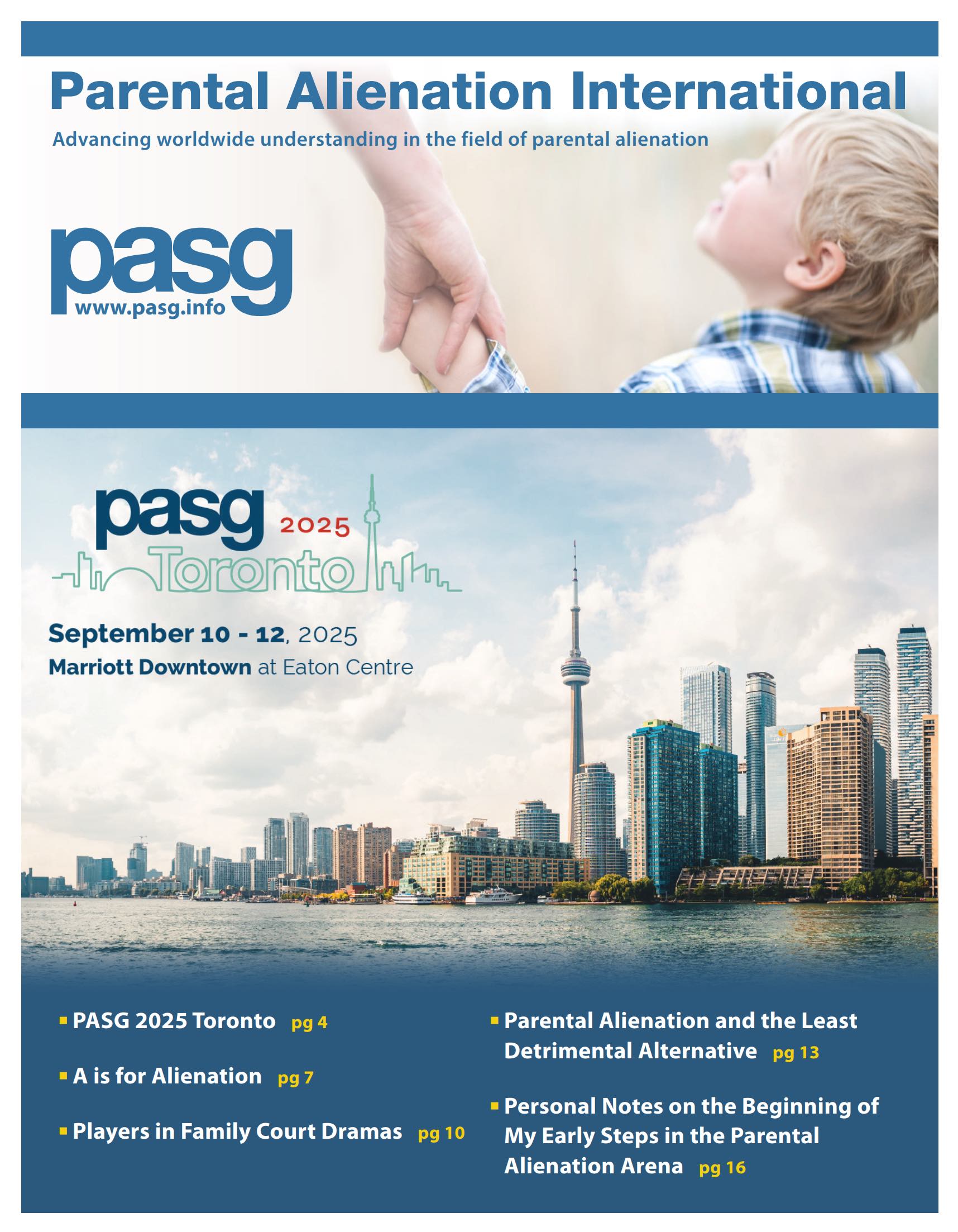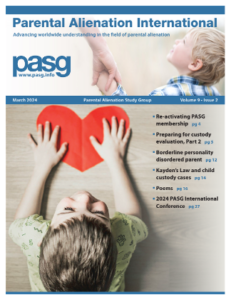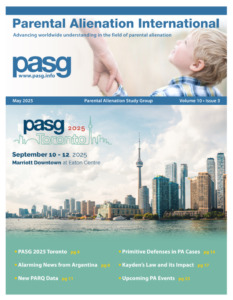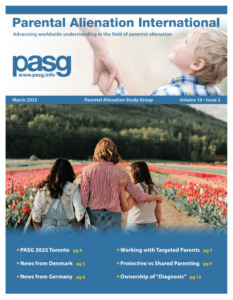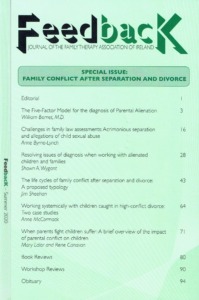Home







Being frozen out of your child’s life for no reason is one of the most heartbreaking experiences a parent can face.
Being frozen out of your child’s life for no reason is one of the most heartbreaking experiences a parent can face.
Being frozen out of your child’s life for no reason is one of the most heartbreaking experiences a parent can face.
We understand this and provide the expertise you need.
Providing the expert help you need when your relationship with your child is being harmed
Providing the expert help you need when your relationship with your child is being harmed
When your relationship with your child is being harmed by a vindictive former spouse or partner, we can help.
Your former spouse or partner has manipulated your children into fearing you.
What are you going to do?
Your former spouse or partner is emotionally abusing your children by alienating them from you.
What are you going to do?
When an adult manipulates a child into saying a beloved parent abused them, the child suffers.
Your children are innocent. They need protection

PsychLaw Provides the Expertise You Can Count On
PsychLaw is a clinical and forensic psychology firm providing psychological services that help courts answer psycho-legal questions. Our orientation is to blend quality science with the law. We specialize in providing expert analysis and testimony in family law cases that involve parental alienation as well as criminal defense for good people caught in bad situations. We provide expert consultation in cross-examination, trial strategy, as well as in depth evaluation of case materials.
 PsychLaw founder was Demosthenes Lorandos, Ph.D., J.D., who is now retired. He was a licensed forensic psychologist and attorney who fiercely advocated to keep junk science out of the courtroom. His work took him across the nation, serving as an expert, case strategy consultant, attorney, lecturer, and author. Dr. Lorandos’s legal and scholarly work on the cross examination of experts, parental alienation, and false allegations has earned him national recognition. The credibility he built allowed him access to resources that other experts did not have — all in the name of blending good science with law. Dr. Lorandos was a peer reviewer for the journals of law and science. He has published a variety of peer-reviewed scientific papers as well as law review and law journal articles in the last four decades. He continues to be a key author in science and evidence law for Thomson Reuters Westlaw®. He has six books in print and has written numerous chapters for forensic science and legal texts. He was regularly asked to teach forensic science and legal advocacy in the continuing education programs of law and the forensic sciences. Dr. Lorandos continues to be the editor-in-chief of the three-volume set, The Litigators Handbook of Forensic Medicine, Psychiatry, and Psychology and his two-volume set, Cross Examining Experts in the Behavioral Sciences was published in 2000 and updated annually for twenty years. (Curriculum Vitae – Dr. Lorandos)
PsychLaw founder was Demosthenes Lorandos, Ph.D., J.D., who is now retired. He was a licensed forensic psychologist and attorney who fiercely advocated to keep junk science out of the courtroom. His work took him across the nation, serving as an expert, case strategy consultant, attorney, lecturer, and author. Dr. Lorandos’s legal and scholarly work on the cross examination of experts, parental alienation, and false allegations has earned him national recognition. The credibility he built allowed him access to resources that other experts did not have — all in the name of blending good science with law. Dr. Lorandos was a peer reviewer for the journals of law and science. He has published a variety of peer-reviewed scientific papers as well as law review and law journal articles in the last four decades. He continues to be a key author in science and evidence law for Thomson Reuters Westlaw®. He has six books in print and has written numerous chapters for forensic science and legal texts. He was regularly asked to teach forensic science and legal advocacy in the continuing education programs of law and the forensic sciences. Dr. Lorandos continues to be the editor-in-chief of the three-volume set, The Litigators Handbook of Forensic Medicine, Psychiatry, and Psychology and his two-volume set, Cross Examining Experts in the Behavioral Sciences was published in 2000 and updated annually for twenty years. (Curriculum Vitae – Dr. Lorandos)
 PsychLaw owner and president Shawn A. Wygant serves as a custody evaluator, parental responsibilities evaluator trainer, case consultant, expert witness, and family therapist. He has been working with Dr. Lorandos for the past 12 years on more than 600 complex domestic relations and criminal cases nationwide. Mr. Wygant specializes in the assessment of parental alienation and other complex forms of psychological child abuse in clinical and forensic settings. His expertise extends to forensic interviewing analysis with the recent publication of his chapter on the protocols used in child sexual abuse forensic interviews published by Thomson Reuters West (See Chapter 23 in The Litigators Handbook of Forensic Medicine, Psychiatry, and Psychology)
PsychLaw owner and president Shawn A. Wygant serves as a custody evaluator, parental responsibilities evaluator trainer, case consultant, expert witness, and family therapist. He has been working with Dr. Lorandos for the past 12 years on more than 600 complex domestic relations and criminal cases nationwide. Mr. Wygant specializes in the assessment of parental alienation and other complex forms of psychological child abuse in clinical and forensic settings. His expertise extends to forensic interviewing analysis with the recent publication of his chapter on the protocols used in child sexual abuse forensic interviews published by Thomson Reuters West (See Chapter 23 in The Litigators Handbook of Forensic Medicine, Psychiatry, and Psychology)
Family, Dependency, and Criminal courts across the country have come to trust PsychLaw experts to help them unpack complex science and law issues. They know when a PsychLaw expert provides testimony, it will be supported by empirical scientific research. [Curriculum Vitae – Shawn Wygant]
Making Things Right, One Case at a Time.
Call +1 (989) 335-5134 or Email swygant@psychlaw.net to schedule your free consultation.
PsychLaw works tirelessly to put the essential research on parental alienation and other vital areas of science into the hands of family law professionals, mental health workers, and targeted parents through these presentations, publications and more:
The Use of Polygraph Evidence in Cases of Parental Alienation [click to download]
By Shawn Wygant
In child abuse investigations that occur during family court proceedings, polygraph examinations are often used to address serious allegations of sexual abuse or domestic violence. This article explores how courts have used and even ordered polygraph examinations for parents accused of sexual abuse. Contrary to a common myth about polygraph admissibility, the results of these examinations are routinely admitted not for the truth of the matter asserted but as part of reports from law enforcement, CPS workers, Guardian ad litems, and child custody evaluators.
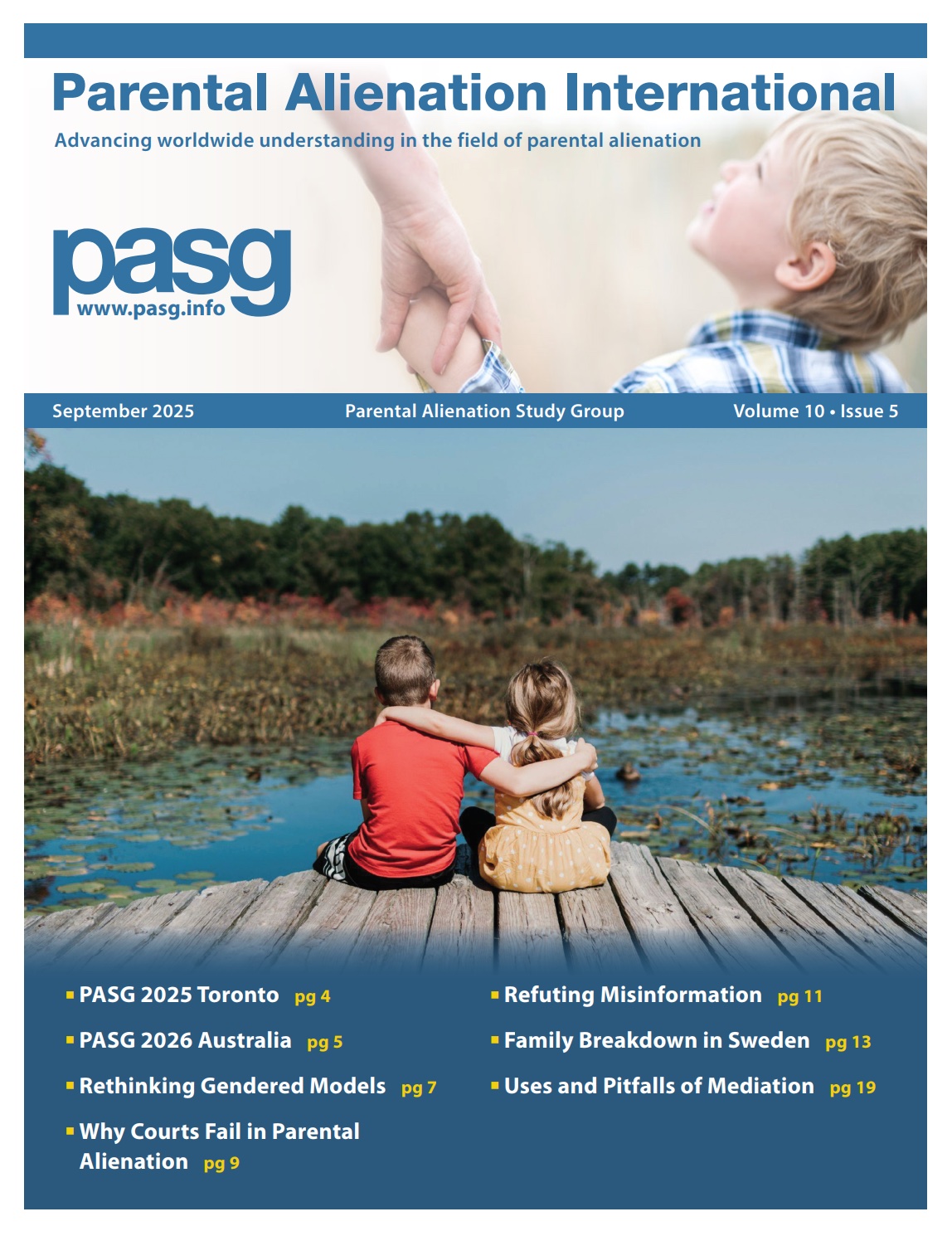 The Child is Too Alienated: Why the Courts Fail to Stop Parental Alienation in Some of the Worst Cases [click to download]
The Child is Too Alienated: Why the Courts Fail to Stop Parental Alienation in Some of the Worst Cases [click to download]
By Shawn A. Wygant
This article explores decisions in some of the most severe cases of parental alienation where the courts decided that the children were too alienated. These are situations where the court effectively terminates the targeted parent-child relationship without any evidence of harm to the child from the targeted parent and allows the children to remain in the custody and care of the alienating parent after it has already been determined that the alienating parent has psychologically abused and harmed the children.
Parental Alienation and the Least Detrimental Alternative [click to download]
By Shawn A. Wygant
This article examines how courts can apply the least detrimental alternative standard when confronted with competing allegations of abuse and parental alienation. Drawing from important appellate decisions—including Sanchez v. Healey and In re Hatton—Wygant offers a solution to judicial reliance on ex parte parenting time suspensions that overlook developmental and relational harm. The article advocates for a layered scientifically informed legal framework that intergrates the best interests of the child standard, the endangerment threshold, and the least detrimental alternative, ensuring protective responses that minimize psychological harm while upholding due process.
Kayden’s Law and Its Impact on Child Custody [click to download]
By Shawn A. Wygant
This article examines the federal Kayden’s Law initiative its potential impact on child custody decisions. Wygant explores how the law’s framing may embolden alienating parents to manipulate the legal system by weaponizing false claims of abuse or violence.
How are Judges and Experts Dealing with Parental 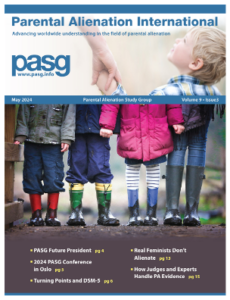 Alienation Evidence? [click to download]
Alienation Evidence? [click to download]
This article analyzes preliminary findings from the PsychLaw parental alienation research initiative which examined how trial court judges address parental alienation allegations in child custody cases. Initial data analysis revealed that in some cases, trial court judges considered a child’s exposure to parental alienation behaviors—even in the absence of parental alienation syndrome symptoms or visitation resistance—as sufficient to warrant a child protective response.
By Shawn A. Wygant
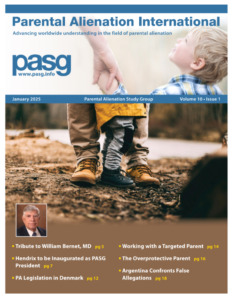 In this article, Wygant explores the distinction between genuine fear and dysregulated fear in children embroiled in parental alienation cases. Focusing on the psychological mechanisms underlying fear responses in young children, he identifies overprotectiveness—often driven by anxious parenting—as a key factor that can lead to the induction of dysregulated fear. Drawing on empirical research in developmental psychology, Wygant explains how children vicariously acquire fear from their caregivers, particularly when one parent is hypersensitive to perceived threats and projects that anxiety onto the child. The article presents a case study of a young alienated child whose reported fear of her father was contradicted by direct observational data, revealing a secure attachment in neutral settings. Wygant emphasizes the importance of comprehensive, context-sensitive observation in custody evaluations to discern the etiology of a child’s fear through rigorous hypothesis testing and differential diagnosis.
In this article, Wygant explores the distinction between genuine fear and dysregulated fear in children embroiled in parental alienation cases. Focusing on the psychological mechanisms underlying fear responses in young children, he identifies overprotectiveness—often driven by anxious parenting—as a key factor that can lead to the induction of dysregulated fear. Drawing on empirical research in developmental psychology, Wygant explains how children vicariously acquire fear from their caregivers, particularly when one parent is hypersensitive to perceived threats and projects that anxiety onto the child. The article presents a case study of a young alienated child whose reported fear of her father was contradicted by direct observational data, revealing a secure attachment in neutral settings. Wygant emphasizes the importance of comprehensive, context-sensitive observation in custody evaluations to discern the etiology of a child’s fear through rigorous hypothesis testing and differential diagnosis.
Primitive Defenses and Group Loyalty in Cases of Parental Alienation [click to download]
This article explains how alienating parents recruit children into loyalty-based alliances that frame the rejected parent as the enemy, often through covert psychological manipulation and emotional enmeshment. These alliances are sustained by the child’s unconscious use of primitive defenses, particularly “splitting”—a psychological mechanism in which the child idealizes the alienating parent and devalues the targeted parent without nuance or ambivalence. Wygant explores how the alienated child’s use of primitive defenses impairs their capacity for independent thought and attachment security with the target parent.
Protective Parenting vs. Shared Parenting Models: Can They Co-Exist? [click download]
By Shawn A. Wygant
This article explores the dual usage of the “protective parent” paradigm in child custody litigation. It distinguishes between legitimate applications—where parents raise credible concerns about abuse—and instances where the term is misused to justify exclusionary parenting behaviors after unfounded allegations. The article examines how this rhetorical misuse has been weaponized against shared parenting models. Through statutory analysis (e.g., Kentucky’s KRS 403.270) and relevant case law, the article demonstrates that shared parenting presumptions do not displace individualized best interest assessments. Courts continue to apply multi-factor analyses to ensure child welfare remains paramount. Empirical research is cited to support the conclusion that children generally benefit from shared parenting arrangements when both parents are fit, and that genuine protective parenting can coexist with shared parenting frameworks under proper judicial scrutiny.
Resolving Issues of Diagnosis When Working with Alienating Children and Families [click to download]
This article discusses a clinical framework for identifying parental alienation as a form of psychological maltreatment using specific abuse subtypes—corrupting, terrorizing, and isolating. It discusses how parental alienation develops through a perverse family drama triangle where the alienating parent forms a cover coalition with the alienated child in an effort to destroy the child’s relationship with the target parent.
Parental Alienation — Science and Law
Edited By Demosthenes Lorandos & William Bernet
Parental Alienation – Science and Law explains the research that creates the foundation for the assessment, identification, and intervention in cases of parental alienation (PA). For attorneys, judges, and family law professionals, this bo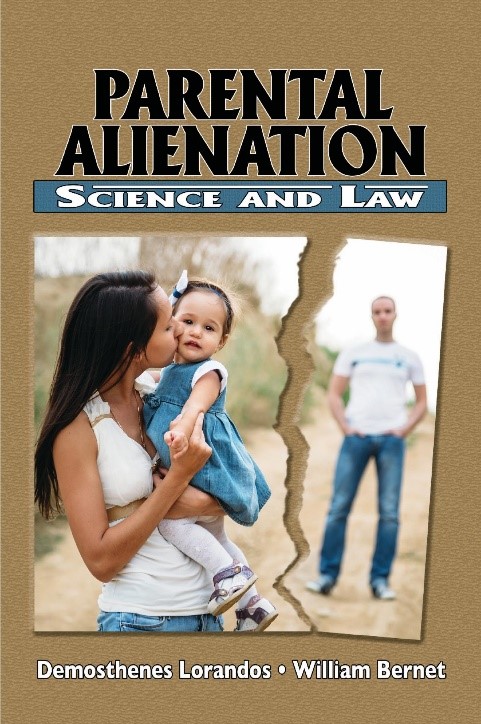 ok explains in detail the scientific basis for testimony and legal decisions that relate to PA. There are two complementary features for most of the chapters. First, the chapter authors address how evidence regarding PA meets the criteria of the Frye, Daubert, and Mohan cases as well as the Federal Rules of Evidence for testimony by experts. The second feature is to refute common misinformation. There is debate and disagreement about some aspects of PA theory. The editors of this book are concerned that some of the discourse regarding PA has spun out of control, into pervasive misinformation. This book provides plenty of evidence for overcoming that hurdle.
ok explains in detail the scientific basis for testimony and legal decisions that relate to PA. There are two complementary features for most of the chapters. First, the chapter authors address how evidence regarding PA meets the criteria of the Frye, Daubert, and Mohan cases as well as the Federal Rules of Evidence for testimony by experts. The second feature is to refute common misinformation. There is debate and disagreement about some aspects of PA theory. The editors of this book are concerned that some of the discourse regarding PA has spun out of control, into pervasive misinformation. This book provides plenty of evidence for overcoming that hurdle.
The editors of this book, Demosthenes Lorandos and William Bernet, and the chapter authors have extensive experience with both clinical and legal aspects of divorce, child custody, parenting time evaluations, PA, and related topics. Editors and chapter authors include six psychologists, three physicians, two social workers, four attorneys, and one judge. Collectively, these mental health professionals have testified as expert witnesses hundreds of times regarding family law topics.
As an additional feature, the book contains four appendices and three indexes. Appendix A defines the concepts used in this book, so that the chapter authors and readers will use terminology in a consistent manner. Appendix B lists more than one thousand trial and appellate cases in the U.S. involving PA, organized by state. Appendix C presents twenty rather dramatic vignettes involving PA. Finally, Appendix D, “Sample Motion and Brief for Extended Voir Dire,” provides a motion and supporting brief asking the court to allow extended time to examine the competency of a proposed expert.
Allegations of Family Violence in Court: How Parental Alienation Affects Judicial Outcomes
 Dr. Harman and Dr. Lorandos tested a set of findings reported by Meier et al. (2019) related to the use of parental alienation as a legal defense in cases in which there are allegations of domestic violence and child abuse. A total of 967 appellate reports in which PA was found or alleged were sequentially selected from a legal database search. Nineteen research assistants blind to the study’s hypotheses coded the reports for the variables used to test six preregistered hypotheses using a series of logistic and linear regression models. The authors failed to find any support for the conclusions made by Meier et al. Parents found (vs. alleged) to have alienated their children, regardless of their gender, had greater odds of losing parenting time, losing custody of their children, and losing their case. These findings held even when the accusing parent had been found to have been abusive. Losses or decreases in custody were not found when the (alleged) alienated parent was found to have been abusive. Results indicate that the majority of courts carefully weigh allegations of all forms of family violence in their determinations about the best interests of children. These findings, along with several others, raise concerns that the methodological, analytical, and statistical problems we detail about Meier’s report that make her conclusions untrustworthy. The discussion section of this article focuses on the importance of using open science practices for transparent and rigorous empirical testing of hypotheses and the dangers of misusing scientific findings to mislead influential professionals who affect the well-being of millions of families.
Dr. Harman and Dr. Lorandos tested a set of findings reported by Meier et al. (2019) related to the use of parental alienation as a legal defense in cases in which there are allegations of domestic violence and child abuse. A total of 967 appellate reports in which PA was found or alleged were sequentially selected from a legal database search. Nineteen research assistants blind to the study’s hypotheses coded the reports for the variables used to test six preregistered hypotheses using a series of logistic and linear regression models. The authors failed to find any support for the conclusions made by Meier et al. Parents found (vs. alleged) to have alienated their children, regardless of their gender, had greater odds of losing parenting time, losing custody of their children, and losing their case. These findings held even when the accusing parent had been found to have been abusive. Losses or decreases in custody were not found when the (alleged) alienated parent was found to have been abusive. Results indicate that the majority of courts carefully weigh allegations of all forms of family violence in their determinations about the best interests of children. These findings, along with several others, raise concerns that the methodological, analytical, and statistical problems we detail about Meier’s report that make her conclusions untrustworthy. The discussion section of this article focuses on the importance of using open science practices for transparent and rigorous empirical testing of hypotheses and the dangers of misusing scientific findings to mislead influential professionals who affect the well-being of millions of families.
Gender Differences in the Use of Parental Alienating Behaviors
By Jennifer J. Harman, Demosthenes Lorandos, Zeynep Biringen & Caitlyn Grubb
 Past research indicates females prefer the use of indirect over direct forms of aggression, whereas the opposite pattern has been found for males. We investigated a specific form of aggression: parental alienating behaviors. Parents who alienate their children from another parent utilize both direct and indirect forms of aggression. We examined whether there are gender differences in the use of these behaviors by analyzing data from two samples: interviews with parents who have been the target of parental alienating behaviors, and family law appellate court rulings in which parental alienation was found. In both studies, mothers used significantly more indirect than direct parental alienating strategies. In contrast, fathers tended to use similar levels of both indirect and direct parental alienating strategies. Further, fathers did not use more direct forms of this type of aggression than mothers. Better standards of practice for the assessment of parental alienation must be developed to prevent misdiagnoses and gender biases.
Past research indicates females prefer the use of indirect over direct forms of aggression, whereas the opposite pattern has been found for males. We investigated a specific form of aggression: parental alienating behaviors. Parents who alienate their children from another parent utilize both direct and indirect forms of aggression. We examined whether there are gender differences in the use of these behaviors by analyzing data from two samples: interviews with parents who have been the target of parental alienating behaviors, and family law appellate court rulings in which parental alienation was found. In both studies, mothers used significantly more indirect than direct parental alienating strategies. In contrast, fathers tended to use similar levels of both indirect and direct parental alienating strategies. Further, fathers did not use more direct forms of this type of aggression than mothers. Better standards of practice for the assessment of parental alienation must be developed to prevent misdiagnoses and gender biases.
Parental Alienation in U.S., 1985 to 2018
By Demosthenes Lorandos
Courts have been dealing with alienating behaviors in high conflict family litigation for hundreds of years. Experts in the behavioral sciences have been writing about mothers and fathers manipulating their children to disparage the other parent for more than seventy years. But in the last two decades some social scientists and legal professionals have questioned the legitimacy of parental alienation as a concept and its admissibility in child abuse and child custody litigation. This study was designed to examine the extent to which courts in the United States have found the concept of parental alienation material, probative, relevant and admissible. Thirty-four years of cases were found with a WESTLAW query and analyzed. Cases were selected for study only if the record reflected that a judge or an independent expert found the concept of parental alienation to be of value in the litigation. Results illustrate increasing awareness of the concept and document its admissibility in every one of the United States. The numbers, sex of the alienating parent and prevalence of significant custody changes are discussed. Limitations inherent in this form of quantitative analysis are also discussed with recommendations for future research.
Making Things Right, One Case at a Time. Call us Today.
When you find yourself in deeply troubled waters and cannot find your way out, these are the experts you want on your side.
Call 989-335-5134 or Email Us to schedule a free consultation. We return all phone calls promptly.
This video is the parental alienation presentation: “When Should a Child’s Exposure to Parental Alienation Behaviors Require a Child Protective Response?” Shawn gave at the 7th International Conference of the Parental Alienation Study Group on September 11th, 2025 in Toronto, Ontario, Canada. Shawn reports on the 2024-2025 PsychLaw parental alienation case law research study involving an analysis of 1,351 appellate court decisions in cases where parental alienation was alleged. The findings suggest that courts in all 50 states are recognizing parental alienation as a form of child abuse and are taking protection action to stop the abuse.
This video features parental alienation expert Shawn Wygant offering an in-depth overview of third-party parental alienation during a documentary interview at the 2019 Parental Alienation Study Group International Conference (September 14, 2019). He explains how alienating parents recruit professional participants (e.g., L-GALs, therapists, and social workers to medical doctors), to act as rescuers in the alienating parent's Perverse Family Drama Triangle which casts the target parent in the role of villain and the child in the role of victim.
Send Us as Description of Your Case:




